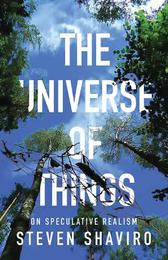
|
The Universe of Things: On Speculative Realism
Paperback / softback
Main Details
| Title |
The Universe of Things: On Speculative Realism
|
| Authors and Contributors |
By (author) Steven Shaviro
|
| Series | Posthumanities |
|---|
| Physical Properties |
| Format:Paperback / softback | | Pages:192 | | Dimensions(mm): Height 216,Width 140 |
|
| Category/Genre | Literary theory
Non-western philosophy |
|---|
| ISBN/Barcode |
9780816689262
|
| Classifications | Dewey:192 192 |
|---|
| Audience | | General | | Professional & Vocational | |
|---|
|
Publishing Details |
| Publisher |
University of Minnesota Press
|
| Imprint |
University of Minnesota Press
|
| Publication Date |
1 October 2014 |
| Publication Country |
United States
|
Description
From the rediscovery of Alfred North Whitehead's work to the rise of new materialist thought, including object-oriented ontology, there has been a rapid turn toward speculation in philosophy as a way of moving beyond solely human perceptions of nature and existence. Now Steven Shaviro maps this quickly emerging speculative realism, which is already dramatically influencing how we interpret reality and our place in a universe in which humans are not the measure of all things."The Universe of Things" explores the common insistence of speculative realism on a noncorrelationist thought: that things or objects exist apart from how our own human minds relate to and comprehend them. Shaviro focuses on how Whitehead both anticipates and offers challenges to prevailing speculative realist thought, moving between Whitehead's own panpsychism, Harman's object-oriented ontology, and the reductionist eliminativism of Quentin Meillassoux and Ray Brassier.The stakes of this recent speculative realist thought--of the effort to develop new ways of grasping the world--are enormous as it becomes clear that our inherited assumptions are no longer adequate to describe, much less understand, the reality we experience around us. As Shaviro acknowledges, speculative realist thought has its dangers, but it also, like the best speculative fiction, holds the potential to liberate us from confining views of what is outside ourselves and, he believes, to reclaim aesthetics and beauty as a principle of life itself.Bringing together a wide array of contemporary thought, and evenhandedly assessing its current debates, "The Universe of Things" is an invaluable guide to the evolution of speculative realism and the provocation of Alfred North Whitehead's pathbreaking work.
Author Biography
Steven Shaviro is DeRoy Professor of English at Wayne State University. He is the author of several books, including Without Criteria: Kant, Whitehead, Deleuze, and Aesthetics and Connected, or What It Means to Live in the Network Society (Minnesota, 2003).
Reviews"Steven Shaviro has long been the most dignified and helpful of Speculative Realism's critics. In this new book, in prose devoid of rancor or backstabbing ambition, he patiently develops the metaphysics of Whitehead into an alternative to the four main strands of Speculative Realism: object-oriented, speculative materialist, vitalist, and scientistic. Shaviro's arguments will interest both the supporters and the detractors of this still young philosophical movement." -Graham Harman, author of Bells and Whistles: More Speculative Realism "Shaviro has done a tremendous service by detailing in clear and precise prose the key tenets and developments of what has come to be known as the 'speculative realist' tradition in contemporary continental philosophy. A standard reference and a useful guide for many years to come."-Notre Dame Philosophical Reviews "Shaviro's summaries of the four Speculative Realists' main doctrines are helpful to beginner and advanced student alike."-TLS "The Universe of Things is the most important monograph yet to address Whitehead's relevance for contemporary philosophy."-Los Angeles Review of Books "As for The Universe of Things, I found it to be extraordinary."-Configurations "An illuminating critical account of the development of speculative realism to date and a significant contribution to speculative realist thought in its own right."-Cultural Critique
|